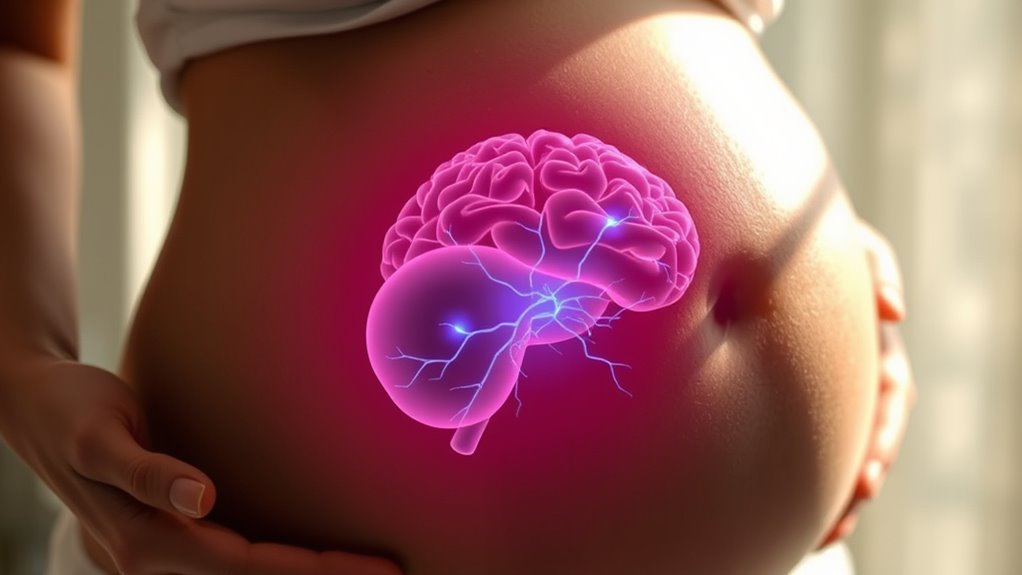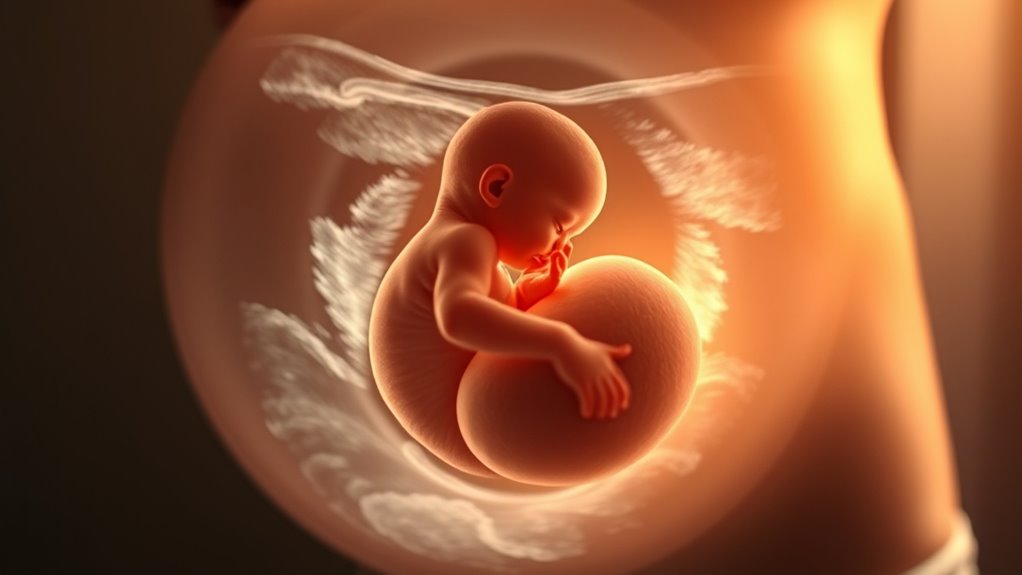You can actively shape your baby’s brain development by focusing on proper nutrition and managing stress during pregnancy. Eating foods rich in omega-3 fatty acids, folic acid, and iron provides essential nutrients for neural growth and brain structure. Additionally, reducing stress with relaxation techniques creates a healthy environment for your baby’s developing brain. Small daily actions make a big difference—learn more about how your choices impact your baby’s future brain health.
Key Takeaways
- Consuming a balanced diet rich in omega-3s, folic acid, iron, and vitamins supports neural growth and brain structure formation.
- Managing maternal stress through relaxation and support minimizes cortisol exposure, promoting healthy fetal brain development.
- Limiting processed foods and high-sugar items helps prevent negative impacts on fetal neural connections.
- Creating a calm, positive environment during pregnancy fosters optimal neural connectivity and emotional regulation in the baby.
- Expectant parents can influence fetal brain health by prioritizing nutrition, stress management, and overall well-being throughout pregnancy.

Fetal brain development is a complex and remarkable process that begins early in pregnancy and shapes the foundation for future cognitive, emotional, and physical functions. As an expecting parent, you have a significant influence on this development through your choices and lifestyle. One of the most critical factors you can control is prenatal nutrition. The nutrients you consume directly impact your baby’s brain growth, supporting the formation of neural connections and protecting developing brain cells. Consuming a balanced diet rich in omega-3 fatty acids, folic acid, iron, and vitamins ensures your baby receives the building blocks necessary for healthy brain development. These nutrients promote proper neural tube formation, support synapse development, and may reduce risks of neurodevelopmental disorders. It’s essential to prioritize wholesome foods—leafy greens, fatty fish, nuts, and fruits—while limiting processed and high-sugar items, which can hinder ideal brain growth.
Equally important is managing maternal stress. High stress levels release hormones like cortisol into your bloodstream, and these can cross the placental barrier, affecting your baby’s developing brain. Elevated maternal stress has been linked to changes in fetal brain architecture, which can influence emotional regulation and cognitive function later in life. You might not always have control over stressful situations, but you can adopt strategies to reduce stress, such as practicing mindfulness, engaging in gentle exercise, or seeking support from loved ones or professionals. Creating a calm and positive environment during pregnancy not only benefits your emotional health but also nurtures your baby’s brain development. Additionally, understanding how prenatal factors influence fetal brain development empowers you to make informed choices. Research also indicates that maternal health can significantly impact neural development, reinforcing the importance of overall well-being during pregnancy. Being aware of environmental exposures and minimizing contact with harmful substances can further support healthy fetal development.
Understanding how prenatal nutrition and maternal stress influence fetal brain development empowers you to make informed choices. Proper nutrition provides the essential nutrients needed for neural growth, while minimizing stress creates a more favorable environment for your baby’s brain to develop perfectly. Remember, small daily actions—eating nutrient-rich foods and practicing relaxation techniques—can have lasting effects on your child’s cognitive and emotional future. Additionally, ensuring adequate intake of critical nutrients such as omega-3 fatty acids can further enhance fetal brain growth. By prioritizing these aspects during pregnancy, you lay a strong foundation for your baby’s lifelong health and well-being. Your efforts now can shape their ability to learn, adapt, and thrive long after birth, making your role in fetal brain development both crucial and impactful.
Frequently Asked Questions
Can Fetal Brain Development Be Affected by Maternal Stress Levels?
Yes, maternal stress levels can affect fetal brain development. When you’re anxious, your body releases cortisol, which can impact your baby’s developing brain. Elevated maternal anxiety and cortisol impact can lead to changes in neural development, potentially influencing your child’s future cognitive and emotional health. Managing stress through relaxation techniques and support can help minimize these effects, promoting healthier fetal brain growth.
How Does Nutrition During Pregnancy Influence Fetal Brain Growth?
Did you know that proper nutrition during pregnancy can significantly boost fetal brain growth? Maintaining a nutritional balance and ensuring adequate micronutrient intake, like iron, iodine, and folic acid, supports healthy neural development. When you prioritize these nutrients, you’re helping lay the foundation for your baby’s cognitive abilities, learning capacity, and overall brain health. Your choices directly influence their future brain development, making good nutrition essential during this crucial time.
Are There Specific Activities That Promote Healthy Fetal Brain Development?
You can promote healthy fetal brain development through engaging activities like music therapy and visual stimulation. Playing calming music or singing to your belly helps nurture auditory pathways, while exposing yourself to colorful images or gentle light patterns can stimulate vision development. These activities foster early neural connections, making your baby’s brain more adaptable and resilient. Incorporate them regularly to support your baby’s growth and future learning abilities.
What Role Do Genetics Play in Fetal Brain Development?
Genetics play a significant role in fetal brain development through genetic inheritance, which provides the blueprint for brain structure and function. However, gene-environment interaction also influences how these genes express themselves, affecting development outcomes. As you nurture your pregnancy, understanding that both your genetics and environmental factors shape your baby’s brain can help you make informed choices to support healthy development.
Is It Possible to Detect Early Signs of Brain Developmental Issues in Utero?
You can detect early signs of brain developmental issues in utero through prenatal imaging and genetic screening. Prenatal imaging, like ultrasounds and MRIs, helps identify structural abnormalities, while genetic screening reveals potential genetic factors influencing brain development. Early detection allows you to work with healthcare providers to plan interventions, improving outcomes. Regular check-ups and advanced diagnostic tools give you the best chance to catch issues early and support your baby’s healthy development.
Conclusion
By understanding how your choices shape your baby’s brain, you can nurture their future from the very start. You can provide love, reduce stress, and create a healthy environment. You can foster curiosity, encourage connection, and build resilience. You can influence their development today, tomorrow, and beyond. So, embrace your role, trust your instincts, and know that every positive step you take is crafting a brighter, healthier brain for your little one’s tomorrow.









